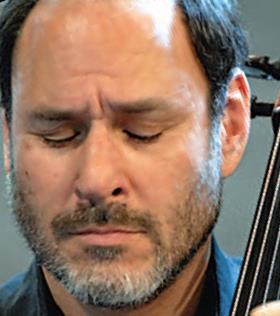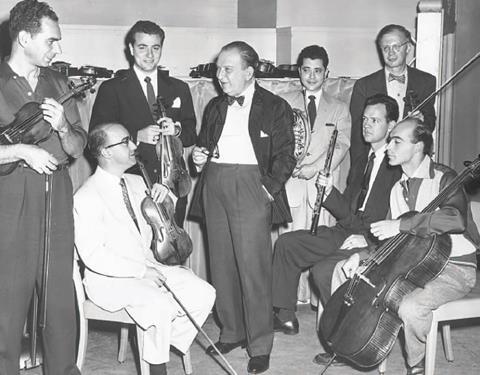2024 marks the centenary of the legendary cellist János Starker. Gary Hoffman shares his memories of Starker, in this tribute from the April 2014 issue of The Strad

Discover more Featured Stories like this in The Strad Playing Hub.
Mr Starker said so much and was so influential. At the same time I’ve gone my own way and that’s the way he wanted it. Sometimes I ask myself why I know something and I don’t know where it comes from – maybe he said something and I’m no longer aware of it. I don’t know what he’d make of that, but I would like to think he’d say, ‘That’s all I ever meant to do.’ That might be disappointing to some people, particularly to Starker students – ‘You mean you don’t remember what he said to you?’ But I don’t see that as a bad thing. For better or worse, I’ve gone beyond just trying to do what I was told to do, and that’s the point. He’d always say, ‘I don’t want anyone to play like me. I want you to understand the principles, how to solve your own problems.’
Some of the things he said were hard to take, but were always meant to stimulate my own thinking. They always had a purpose. That’s what a pedagogue should do. Mr Starker used to say that everything can be articulated, explained, defined and analysed, and he was right. The only mystery is why some people can and some can’t. If the answer isn’t within you it doesn’t matter. You can have all the information possible and it won’t make any difference.
What I knew, even if I couldn’t articulate it at the age of 18, was that I never felt he was saying anything that wasn’t intended to help me. I remember playing in a class once, and I finished and he gave me feedback. Someone came up to me and said, ‘You must be devastated.’ I asked, ‘Why would I be?’ They replied, ‘Because he tore you apart!’ I said, ‘Really, do you think so?’ I wasn’t devastated at all – he was just trying to get me to understand something.
Seeing him much later in life, I said to him, ‘Professor, I remember one lesson when you were really tough,’ and he looked at me with this malicious smile and said, ‘Yeah, I was really nasty that day, wasn’t I?’ And he smiled. I looked at him and knew it was never meant to hurt. He loved teaching, and it mattered too much to him to see people go forward and understand.

Once I played a recital, and I didn’t play badly, but he came up to me afterwards and said, ‘You need to be in love.’ Of course that’s easier said than done, but that was his way of saying you can’t solve everything by practising. There’s more to life than fingerings and bowings and Popper etudes. That’s an important lesson for a young musician to learn. I understood.
I remember playing a Bach allemande one lesson, and I stopped and said, ‘It could go this way or that way,’ and he looked at me and said, ‘Just decide.’ I thought it was a little cut and dried, but then I understood that at the moment you play, you have to come to a decision. You can change it a second later, but at the moment you play it you have to be decisive.
Any student who had exposure to Mr Starker knows that there are many different issues that come to bear on being a musician, and awareness of the body is one. He used to say, ‘I want people to play late into their lives – I don’t want their careers to be over at the age of 35.’ He was right. Cello playing takes its toll, but I’ve never had a serious problem. You have to be naturally strong to withstand this kind of life and cello playing itself but there’s no question that an awareness of the body is a factor in good health and that was something that was always important to him.
When I went to him I could play, but he changed a lot of things. I went through a period when I didn’t feel myself, but over time what he gave me was invaluable. I don’t know where I’d be today if it weren’t for having gone through all of that. He was able to give the tools you need to identify, analyse and solve. I can’t imagine what better ability a teacher can give you than the ability to teach yourself.
INTERVIEW BY ARIANE TODES
Read: János Starker: King of Cellists
Read: How to play with a flexible bowing arm by cellist Gary Hoffman
Discover more Featured Stories like this in The Strad Playing Hub.
The number one source for playing and teaching books, guides, CDs, calendars and back issues of the magazine.
In The Best of Technique you’ll discover the top playing tips of the world’s leading string players and teachers. It’s packed full of exercises for students, plus examples from the standard repertoire to show you how to integrate the technique into your playing.
The Strad’s Masterclass series brings together the finest string players with some of the greatest string works ever written. Always one of our most popular sections, Masterclass has been an invaluable aid to aspiring soloists, chamber musicians and string teachers since the 1990s.
American collector David L. Fulton amassed one of the 20th century’s finest collections of stringed instruments. This year’s calendar pays tribute to some of these priceless treasures, including Yehudi Menuhin’s celebrated ‘Lord Wilton’ Guarneri, the Carlo Bergonzi once played by Fritz Kreisler, and four instruments by Antonio Stradivari.













































No comments yet